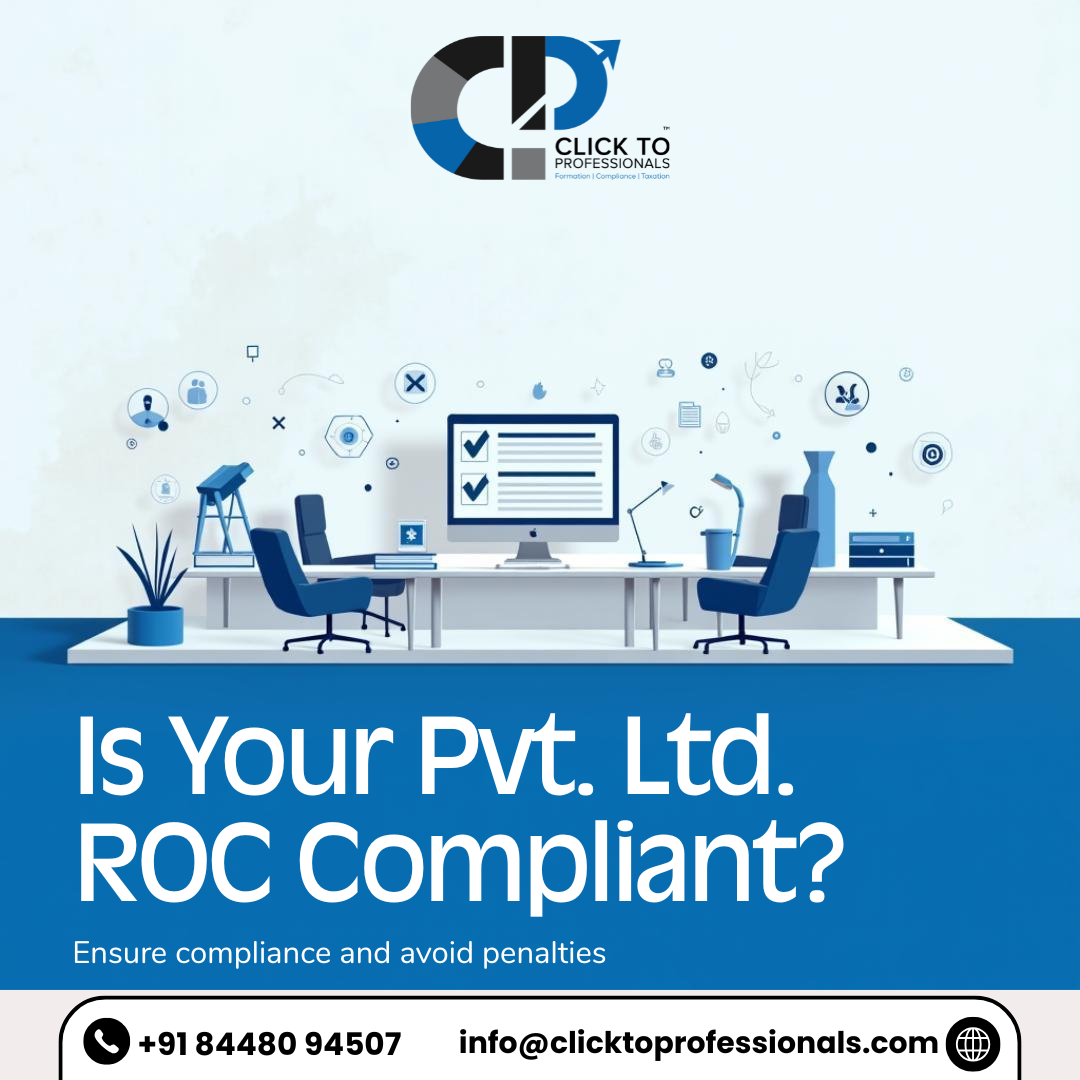
ROC compliance is not only the law for all private limited companies in India, it’s also a key part of building credibility, attracting investors, and avoiding expensive fines. The Ministry of Corporate Affairs (MCA) has made rules and deadlines stricter for ROC 2025. This makes it more important than ever to file on time and correctly. This blog is your easy-to-understand ROC Filing Guide for MCA Filing Companies. It’s full of tips, deadlines, and step-by-step instructions to help you get good at ROC Compliance Private Limited.
Why private limited companies need to follow ROC Compliance rules
All private limited companies have to file an MCA. If you miss a deadline or send in the wrong forms, you could face heavy fines, the removal of a director, or even the company being struck off. Following the rules helps your business run smoothly and without any problems. It also builds trust with banks, investors, and customers.
Important ROC Rules That Private Limited Companies Must Follow in 2025
Let’s look at the important documents and due dates that need to be filed for private limited ROC compliance in 2025:
1. DIR-3 KYC
- Goal: Update director Know Your Customer (KYC) for all directors who have an active DIN.
- Due date: September 30, 2025.
- If you don’t file on time, you will be fined ₹5,000 per DIN
2. DPT-3
- Purpose: To return deposits and exempted deposits every year.
- Due date: June 30, 2025.
- Penalty: Depending on how long you wait, up to 12 times the normal fees
3. MSME-1
- This is a return for payments that are still due to micro or small businesses every six months.
- Due dates are April 30, 2025, for October through March, and October 31, 2025, for April through September.
- Penalty: The company could face up to ₹3 lakh in fines and jail time for not following through.
4. ADT-1
- The purpose is to hire an auditor.
- Due Date: Within 15 days of the AGM, or by October 14, 2025, if the AGM is on September 30, 2025.
- The fine is up to 12 times the normal fees.
5. AOC-4 and AOC-4 XBRL
- Goal: To turn in audited financial statements.
- Due date: 30 days after the AGM, which is usually October 30, 2025.
- Fine: ₹100 per day of delay, with no maximum
6. MGT-7 or MGT-7A
- The goal is to file the annual return.
- Due date: at least 60 days after the AGM, which is usually by November 29, 2025.
- Fine: ₹100 per day of delay, with no maximum 41523. 7. PAS-6 Purpose: Reconciliation of share capital audit report (for unlisted public companies).
- Due dates are May 30, 2025, for October through March, and November 29, 2025, for April through September.
8. BEN-2
- Purpose: Declaration of significant beneficial ownership.
- Date: Within 30 days of getting the BEN-1 declaration.
- “CRA-4” is used to file a cost audit report, if needed.
- Due date: 30 days after getting the cost audit report
In Steps How to File with the ROC for Private Limited Companies
1. Keep a calendar for compliance
A yearly compliance calendar can help your business keep track of all its MCA and ROC due dates. This helps you plan your filings ahead of time and makes sure you never miss a due date.
2. Get documents together and get them ready
Gather all the important papers, like audited financials, board resolutions, and Know Your Customer (KYC) information, well before the due dates. For easy MCA filing, make sure all the information is correct and up to date.
3. Fill out the right forms online.
On the MCA portal, all ROC forms must be sent electronically. Include digital signatures and any supporting documents that are needed. Check each entry twice before sending it in to avoid being rejected or given a penalty.
4. Keep an eye on the acknowledgements and receipts
Download and save the acknowledgement receipts from the MCA portal after you have filed. 5. Get help from a professional if you need it. These are proof that you followed the rules and may be needed during audits or funding rounds.
5. Talk to a company secretary (CS) or chartered accountant (CA).
Compliance expert if you don’t understand any part of ROC for Pvt. Ltd. They can help you understand the new rules and avoid mistakes that cost a lot of money. 23.
Things that ROC Compliance Private Limited should not do wrong
- Not meeting due dates or turning in forms late
- Sending information that is missing or wrong
- Not updating the director’s Know Your Customer (KYC) information or changes to their shareholding
- Not paying attention to event-based filings (like when an auditor is hired or when beneficial ownership changes)
- Digital records and receipts that are not kept
- Each of these mistakes can get people fined, in trouble with the law, or even kicked off the board
ROC 2025 Penalties for Not Following the Rules
- Penalties for not following the rules are harsh and can include
- ₹100 for every day that AOC-4 and MGT-7 filings are late, with no maximum amount.
- It costs up to 12 times as much to file DPT-3 and ADT-1 forms late.
- 5,000 naira for each director for late DIR-3 KYC
- company strike-off and director disqualification for repeated failure to follow the rules.
Why meeting ROC requirements on time is good for your business
- Clients, investors, and banks will trust you more.
- Avoids getting in trouble with the law and paying fines
- Helps a company’s creditworthiness and reputation
- Lets the directors and the company keep their chances of getting future business and government programs
- Makes sure everything runs smoothly and gives management peace of mind
In 2025, make ROC compliance a top priority.
Every private limited company that wants to grow and stay stable in 2025 needs to learn how to use ROC Compliance Private Limited. If you use a compliance calendar, follow this ROC Filing Guide, and keep up with your MCA filing, you can keep your business penalty-free and ready for new opportunities. Remember that ROC for Pvt Ltd filings that are done on time and correctly are your best defense against legal and financial problems in the world of MCA filing companies. Don’t just think about following the rules; do it all the time. This will help your business do well in ROC 2025.
Contact Us:
Call us at +91 84480 94507 or email us at info@clicktoprofessionals.com for any queries.
Choose Click To Professional—Your Partner in Business Success.
You Might Also Like: ITR Filing for Freelancers: Tips and Tricks for 2025

